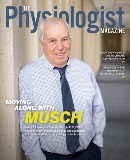Prepare Now for the Career You Want
Tips to set yourself up for career success.
 Each issue,
we ask a student or early-career member to pose their career questions to an established investigator and mentor. Here, Mareena Pitts, a PhD candidate at Morehouse School of Medicine in Atlanta, asks Bonnie L. Blazer-Yost, PhD, FAPS, advice on how
to create a successful career. Blazer-Yost is director of the Hydrocephalus Research Center and professor of biology at IUPUI in Indianapolis.
Each issue,
we ask a student or early-career member to pose their career questions to an established investigator and mentor. Here, Mareena Pitts, a PhD candidate at Morehouse School of Medicine in Atlanta, asks Bonnie L. Blazer-Yost, PhD, FAPS, advice on how
to create a successful career. Blazer-Yost is director of the Hydrocephalus Research Center and professor of biology at IUPUI in Indianapolis.
What topics do you think will drive the field of physiology forward in the next 5–10 years?
The biggest contributions that physiology has always made, and continues to make, are those aimed at deep understanding of the physiological responses to alterations in homeostasis, for example, pathophysiology. Physiologists tend to have a more
whole-body perspective than most other disciplines, and this is crucial for the development of disease treatments.
What advice would you give an early-career scientist to ensure their success?
First, seek formal and informal mentor-type interactions not only in your own institution but within your wider scientific circle. This doesn’t have
to be long-term or time-intensive; it can be as simple as asking a senior scientist for advice on a method or help with interpreting some particularly complex data sets. I know this is hard, particularly if you are a shy person, but you will find
that most scientists are very approachable and willing to interact with early-career scientists. Some of my lifelong colleagues and collaborators are people I met at APS poster sessions.
Also, learn how to write grants as early as possible. One of the best ways is to offer to help your principal investigator or other senior scientist with their grant submission. Even if you are writing up methods or putting together figures, the experience of what is involved is very instructive. If you are helping to put together a grant submission, chances are you will be included in the cadre of people who hear how that grant fares in the review system.
Finally, and arguably most importantly, don’t hold on to your hypotheses when the data are telling you they are not correct. However, don’t give them up without delving into why they failed and what that failure is telling you. In my career, the most important discoveries were the result of failed hypotheses.
What strategies do you employ to manage stress and time management?
This is a difficult question for all scientists, particularly women. Achieving a work-life balance is not easy. For me, personally, I write everything down and keep
a handwritten monthly schedule in pencil so I can erase things as they get done. Very old-fashioned, I know, but once something is written down, I find I can stop worrying about it. Then, since I am a morning person, I try to force myself to do the
least favorite tasks (endless paperwork) first, so the afternoon is left for fun things. I find that interacting with my trainees on a regular basis decreases stress because it is so much fun to discuss their results and help plan the next experiments.
In what ways can a physiologist contribute to the ongoing need to improve diversity, equity, inclusion and accessibility in the workplace?
My experience has been that the more diverse a laboratory group is the better they will function
together. In a diverse group, no one has preconceived notions that other members should be like them and, therefore, one tends to accept differences more readily. Most people, and certainly most scientists, have an innate curiosity about others and
wish to understand other perspectives and cultures. One of the most important things we can do is to further encourage this inclusive behavior for all groups and cultures.
Got a career question you'd like to submit? Email it to tphysmag@physiology.org. We may use it in an upcoming Mentoring Q&A.
This article was originally published in the May 2024 issue of The Physiologist Magazine. Copyright © 2024 by the American Physiological Society.
The Physiologist Magazine
Read the Latest Issue
Don’t miss out on the latest topics in science and research.
View the Issue Archive
Catch up on all the issues of The Physiologist Magazine.
Contact Us
For questions, comments or to share your story ideas, email us or call 301.634.7314.


